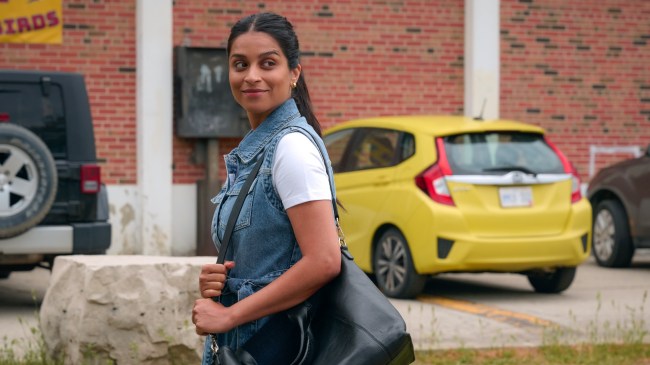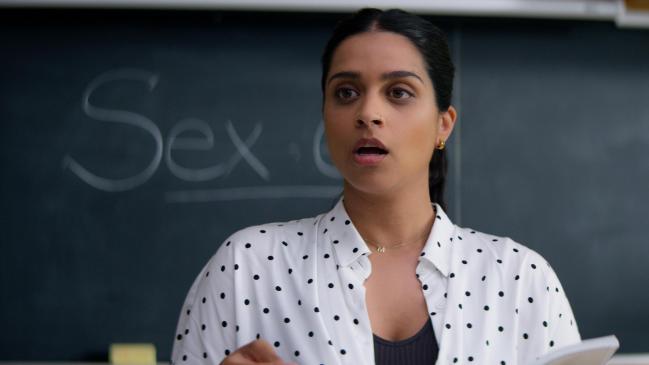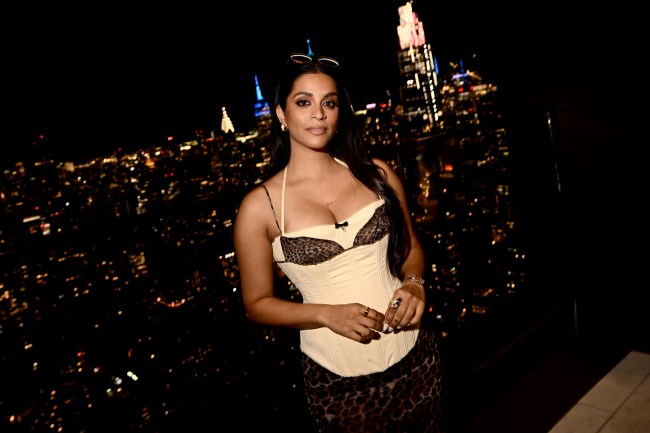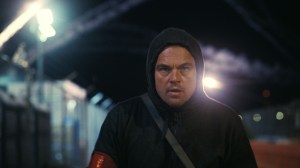Lilly Singh is talking about sex a lot lately.
A promo reel for her comedy “Doin’ It” features the writer, comedian, and internet juggernaut saying sexual things directly into camera (personally, I like “Pull out your wallet”) — but there’s one word she can’t stand that has nothing to do with the film‘s raunchy subject matter: niche.
“I feel like I want to tell stories that every exec is gonna be like, ‘No, that’s too niche,’” Singh told IndieWire during a recent interview. “The word niche triggers me, because we’re not niche. We’re not at all niche, and that’s just a word that’s used against us.”
Sara Zandieh’s “Doin’ It” is explicitly a sex comedy from the South Asian perspective, starring Singh as thirty-something virgin Maya — who not only has never had sex, but even a sex talk — and is suddenly tasked with teaching sex education to teens. It’s the type of film many a Hollywood exec would pass on for a number of reasons, and that only drew her to it more. In the seven-year process of bringing “Doin’ It” to theaters, Singh realized she had to go balls-to-the-wall with the opportunity, because it might never come again.
“I want to tell stories for our community and that highlight our unrepresented voices, because I think it’s tragic that we don’t get to see all facets of us on screen,” she said. “I think it really hinders our community’s progress in a lot of ways.”
Below, Singh speaks with IndieWire about finding her creative voice in feature film, how important “Doin’ It” is to her mother and aunties, and why she’ll never produce again (she will, though).
The following interview has been edited and condensed for length and clarity.
IndieWire: You’ve been working on this film for a while — what sparked it originally?
Lilly Singh: A mere seven years ago, Neel Patel — an amazing writer, one of the co-writers on this — sent me this script, and I just fell in love with the idea of a sex comedy from the South Asian perspective, through the South Asian lens. I’ve never seen something like that. Little Lilly would have benefited so much if she had something like this.
What was the process like for you specifically? You’ve been writing your own material for a long time.
I’ve written short form content for a really long time, so this is my first time doing a feature script. There was a big learning curve for me; I have to think about longer character arcs, I have to follow all these rules. The hardest thing for me is that I come from a place where I made all of the rules, I decided what went live, I decided what the edit was, I decided what jokes were in and were out, and what was funny and what was not.

When you’re doing a film, you’ve got 90 minutes. There’s a time that you gotta hit, there’s a page count that’s ideal for execs to read. There’s producers that don’t understand this joke and then you gotta workshop this joke, and then there’s things that don’t get cleared. It’s definitely a process for me to be like, “OK, how do I maintain my creative integrity, but also make sure I don’t get sued for $6 billion and that this movie is actually able to release in the theater?”
I know you’ve been part of films before, but what was the biggest learning curve in that regard?
I’ve acted before, writing is different, but I also produced this movie. Producing is a lot, let me tell you. Love acting, love writing — producing? Could do without her, not gonna lie. She’s tough. You don’t realize, there’s so many things that go into making a movie bet on the big screen. The music clearances, clearing any clip — it’s a lot, so that was a huge learning curve for me. Even the distribution of this, it’s my own team that’s executing a lot of this stuff. We shot the key art in my garage. My own team is doing social strategy. You’re learning all these things, like a rating of a trailer, if releases in America, it’s this process, in Canada, it’s by province. It just a lot. Movies are hard!
It sounds like you learned a lot though, and looking forward, you have a lot of new skills.
I got a crash course in movie-making. Don’t get me wrong, I still by no means know everything. There’s a lot I have to learn, but I do feel like, especially the past year, I’ve had a crash course in how to release a movie. So next time, and there will be a next time, I’ll be just that much better equipped.
What was the biggest takeaway for you?
My biggest takeaway from acting was that I really learned through this film that acting can be quite healing and therapeutic for the actor. The concept of this movie is about sex ed, it’s about a thirty-something-year-old virgin who finds herself teaching sex ed. There’s themes around sex and sexuality and shame and all this stuff — I can tell you as an actor, as the person behind the role, I have literally healed some of my trauma through playing this character. I’m talking about sex now in a way I’ve never been able to, I feel more confident my body than I’ve ever felt in my body.
Writing — listen, I’ve tried for years to repel against this, but I’ve just fully embraced and accepted that I am a sensitive artist. I am. When I write things and I have certain concepts, they’re really precious to me. I did learn through this movie that it’s OK to be like that, but there’s also great power in collaborating. Some of the best scenes of the movie were birthed because of collaboration and because of multiple people’s ideas, so I had to humble myself in that way a little bit.
And then, as a producer, my biggest takeaway is I don’t want to do it again! I probably will have to, but my God, when I tell you, producing is not fun. All the producers that are out there: more power to you. I don’t know how you do it.
What were some of your inspirations for Maya as a character?
Honestly, myself. A lot of Maya is true to me. A lot of things she says are things I verbatim have said in therapy or verbatim have said to my friends. A lot of the earlier scenes in the movie that take place in India are mirrored off of my mom’s upbringing. I really did pull from the generation of women that came before me, because I didn’t get the talk, my mom didn’t get the talk, my mom’s mom didn’t get the talk. I’m pulling from all of our generational trauma and infusing it into this character. And that’s what art is, is taking pain and turning it into a sex comedy, isn’t it?
This movie is so sex-positive, and especially for young people who need that quite badly. But it’s also hard to do from even our perspective in our thirties, so how did you guys approach that?
We had to do a lot of research to make sure that how we’re representing the younger kids in the movie is accurate. I talked to a lot of my younger nieces and nephews: “What is your generation doing in this regard?” There’s a lot of research that went into it, not only for the kids, but the teacher that I play, she’s teaching these kids, and I wanted that school experience to be true to what’s happening as well. Let me not paint a picture that’s not accurate.

My first cousin is a teacher, and so I sat down with her to be like, what is sex ed like? What do they teach? And I was shocked that she told me that in today’s day and age, still she has parents that pull their kids out of sex ed. That blows my mind. There’s a lot of things in the movie where people might watch and be like, “This doesn’t happen. Is that a thing?” But it does.
There’s still a lot of really negative discourse around sex and sexuality and sexual health, and so we just want to do our part to make sure we’re talking about in very positive way — which is also why Maya, though she’s a virgin, she’s not the butt of a joke. The movie is not about her ultimately losing her virginity. It’s about her unlearning shame and making choices that are right for her. I think that’s the best positive message you can give people, especially women. I don’t think we were ever taught that we could feel empowered to make our own choices. Society was always telling us when and what and how and all that stuff.
How did you guys land on the tone of the film?
A few drafts before the final draft, I was like, “This is it. This is good. It’s amazing.” And then I did a table read. I always do this with my projects. I did a table read where I invite a bunch of my friends, people from different backgrounds, writers, and industry folks. And after that table read, every person’s feedback was, “It needs to be dirtier, it needs to be raunchier, it needs to push it further.” I was like, “OK, I was not expecting that!”
So we landed on the tone because we invited a bunch of freaks to a table read, and they were like, “Make it more freaky.” I will also say we’re dealing with a taboo subject. It’s through the South Asian lens. It’s already not a normalized conversation. If I’m gonna go for it, like I actually have to go for it. There were some choices we had to make where we were like, “This is a lot but we gotta go for it.” We’re trying to normalize this conversation, and I feel like that required taking a few big swings.
The nightmare for any Desi kid is your parents finding out that you even know about sex.
Our parents are virgins. We know this.
They don’t know about it, we don’t know about it. But with that in mind, what has been the wildest part of this press tour and process?
The wildest part of this for me has been the fact that my mom actually helped on the movie. She is the credited cultural consultant on the movie. She was on set helping us, making sure the Punjabi, the Hindi, was on point, making sure all the writing on the wall was on point. The school classroom was mirrored off of her school classroom. That’s wild. I never thought in my adult life I would say that I did a sex comedy and my mom helped on it. She has not watched it yet. That’s gonna happen tonight. So she wasn’t there for the intimate scenes.
I was at a family party the other day, and my cousin surprised me with this cake made of boobs, and the way my aunties — of course, the uncles just were silent in the corner, as they are — but the aunties, they’re so excited to watch this movie. I never thought in my adult life, my group of otherwise pretty reserved aunties would be so down with this — because, let’s be real, they didn’t get the talk either. They’ve not got the chance to be liberated either, and so I just really hope that they get to all go. I encourage all groups of aunties just go, leave your kids at home, get some drinks, go to the theater and live your life. That’s been the craziest part.
That’s so awesome to hear. What’s something that made you guys laugh a lot, either on set or in the writing process, or both?
You’re shooting a sex comedy. At the end of the day, we can’t be that stressed. We got to just take a step back and roll with the punches. What made me laugh a lot is in one of the scenes of the film, I have a intimate scene with Utkarsh Ambudkar, who is, in real life, like my brother. We call each other bro and sis, and we have an intimate scene. I vividly remember us both being there, being like, “OK, we’re gonna have to go into a different place right now.” And we did, but we laugh about that a lot, the fact that I, literally before and after that scene, called him bro, and make out with him in the middle of that interaction. It’s one of those, “What is my life” situations.
I am very concerned about your mom watching that specific scene.
Yeah, I’m more concerned about my dad.
I didn’t even think about Uncle, oh my god.
I think my mom is low-key gonna be like “Sick,” but I don’t know my dad’s gonna have that reaction. But I have confidence in both of them that they will see the greater good.
Who is the unsung hero of this movie?
I don’t think she’s an unsung hero, because I think that she’s very sung but Sabrina Jalees, who plays my best friend Jess in the film, she’s absolutely incredible. So much of the comedy works because of her, but she was also just such a delight on set, so easy to work with. I could not have hoped to have better chemistry with whoever played my best friend, because I knew her before this film, but we didn’t actually ever hang out. I just adore her and love her, and I think she’s one of the most talented comedians that exists on this planet. A lot of those scenes are improv with me and her, and you should see the deleted scenes. Any scene you see in the movie, just know that for 10 whole extra minutes we keep going, we would just keep going until someone yelled “cut,” so the movie could have been 16 hours long.
I know you spent a lot of years working on this one and it came from a personal angle, but when you’re thinking about making another movie — maybe not as a producer — what interests you moving forward?
I think the reality is I’ll have to be a producer, unfortunately. That’s actually ungrateful — fortunately, but also I’ll need a lot of therapy. I have two follow-up scripts already that I want to make. Everything I want to make can best be described as entertainment-first content that has a message. I don’t I never want to just create noise. There’s a lot of noise out there, I have to be saying something.
My dream project is actually a project that is based on my real life aunties because I’m obsessed with them. They call themselves the Fun Gang. That’s a true story. It’s kind of like “Girls Trip” with four Indian aunties. That’s the next movie I want to make. The reason I say I probably will have to produce it is because that’s the exact type of movie that a studio exec is going to be like, “Absolutely not.” And that’s generally my taste.
I want that movie very badly. What is something from decades of writing short form that really helped you out here?
When I did a decade of making YouTube videos, I did every role, for the most part. I have shot myself, I’ve edited myself, I’ve written, I’ve done a lot of it. So when I’m on a set, I’m very much able to see the edit as we’re shooting, as an actor as well. A lot of times a director will come up to me and they’ll say, like, you really understand what’s happening, and I do. I understand where I have to do a line pickup from, I understand why this continuity matters, because I’m just like, editing it in my brain by nature.
I will also say, I have a built-in marketing machine. Because all YouTube was was marketing — promoting this video, making this thumbnail, making sure that the social assets were popping — so I pride myself on kind of having a 360 knowledge. Not 360, I shouldn’t say, maybe 250 knowledge around what it takes to do things like this. I feel really well-rounded, and I think my team is very well-rounded because of my beginnings on YouTube.
You have built an empire, what is your favorite piece of that right now and something you would like to get into in the future?
Acting is where — I want to put all my eggs in that basket. I really, really love acting. I find it so therapeutic. I find it really challenges me, and I find it really helps me learn about myself and the world in really amazing, spiritual, deep ways. So part of my — thank you for saying I have an empire — but part of my empire is definitely telling these stories. I love acting, but what I love more than anything is just making sure dope stories get told.
I would be so happy even if I created something and someone else was a lead of it. I’m fine with that too. I think the part of my empire I’m really precious about is like, I want to tell stories that I did not have growing up. It actually, like, aggravates me. It’s a passion, but it’s also like a chip on my shoulder, where I just believe in the power of storytelling and I think it’s tragic that there’s still so much gatekeeping around what gets attention, what gets to be made, and what gets green lit. I think it’s tragic, and I want to try to change it.
Aura Entertainment will release “Doin’ It” in theaters on Friday, September 19.

